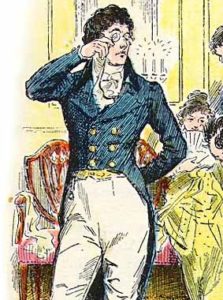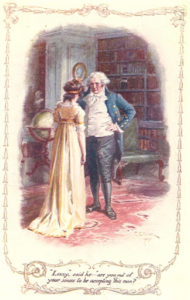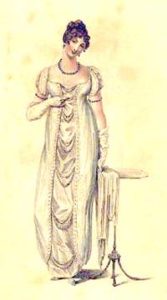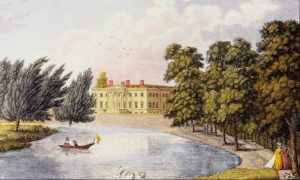Love and hate. Jane Austen wrote about them both, sometimes in the same novel, and about the same characters. The love/hate relationship that first comes to mind is of course that of Darcy and Elizabeth in Pride and Prejudice. The word hate is used several times in describing Lizzy’s early prejudiced feelings about Mr. Darcy. It is a strong word, more emphatic than just saying she didn’t like him, didn’t care for him; but Lizzy is one to be playful and occasionally exaggerate her words for effect.
Her pride hurt by Darcy’s initial disdain of her, when he asks her to dance at the Netherfield ball, she is startled. Her friend Charlotte says, “I dare say you will find him very agreeable.”
To which Elizabeth replies, “Heaven forbid! That would be the greatest misfortune of all! — To find a man agreeable whom one is determined to hate! Do not wish me such an evil.”
Over the course of the novel, her sensations about Darcy undergo a gradual change, as she comes to realize that her former favorite, Wickham, is undeserving, and Darcy the far more worthy man. And so, when she visits Pemberley, she examines her feelings in this crucial scene: “…the evening, though as it passed it seemed long, was not long enough to determine her feelings towards one in that mansion; and she lay awake two whole hours endeavouring to make them out. She certainly did not hate him. No; hatred had vanished long ago, and she had almost as long been ashamed of ever feeling a dislike against him, that could be so called. The respect created by the conviction of his valuable qualities, though at first unwillingly admitted, had for some time ceased to be repugnant to her feelings; and it was now heightened into somewhat of a friendlier nature by the testimony so highly in his favour, and bringing forward his disposition in so amiable a light, which yesterday had produced. But above all, above respect and esteem, there was a motive within her of goodwill which could not be overlooked. It was gratitude — gratitude, not merely for having once loved her, but for loving her still well enough to forgive all the petulance and acrimony of her manner in rejecting him, and all the unjust accusations accompanying her rejection.”

“She is tolerable…”
After she accepts Darcy’s proposal, the question of love and hate is pointedly highlighted as she is ironically forced to explain herself to her father:
“Her father was walking about the room, looking grave and anxious. ‘Lizzy,’ said he, ‘what are you doing? Are you out of your senses, to be accepting this man? Have not you always hated him?’
How earnestly did she then wish that her former opinions had been more reasonable, her expressions more moderate! It would have spared her from explanations and professions which it was exceedingly awkward to give; but they were now necessary, and she assured him with some confusion, of her attachment to Mr. Darcy.
‘Or, in other words, you are determined to have him. He is rich, to be sure, and you may have more fine clothes and fine carriages than Jane. But will they make you happy?’
‘Have you any other objections,’ said Elizabeth, ‘than your belief of my indifference?’
‘None at all. We all know him to be a proud, unpleasant sort of a man; but this would be nothing if you really liked him.’
‘I do, I do like him,’ she replied, with tears in her eyes; ‘I love him. Indeed he has no improper pride. He is perfectly amiable. You do not know what he really is; then pray do not pain me by speaking of him in such terms.’”

That is hate turning into love, in the hands of Jane Austen. But she also can be seen turning love into hate. In Mansfield Park, it is Maria Bertram’s passionate love for Henry Crawford that is her ruination, and it is exactly the opposite of Elizabeth Bennet’s feelings for Darcy, for is a love that ends in hatred. In Jane Austen’s psychologically astute portrayal, Maria’s changing feelings and circumstances are seen when Henry Crawford leaves Mansfield Park without proposing to her. “A few moments of feverish enjoyment were followed by hours of acute suffering…Maria saw with delight and agitation the introduction of the man she loved to her father. Her sensations were indefinable, and so were they a few minutes afterwards”- when she hears Henry Crawford tell her brother that he is leaving. Understanding from this that there will be no proposal, Maria silently considers “The hand which had so pressed hers to his heart! the hand and the heart were alike motionless and passive now! Her spirit supported her, but the agony of her mind was severe…He was gone—he had touched her hand for the last time, he had made his parting bow, and she might seek directly all that solitude could do for her. Henry Crawford was gone, gone from the house, and within two hours afterwards from the parish; and so ended all the hopes his selfish vanity had raised…”

Maria, we are told, “wanted neither pride nor resolution,” and when she realizes that “there was no return, no letter, no message, no symptom of a softened heart, no hope of advantage from separation, her mind became cool enough to seek all the comfort that pride and self revenge could give…Henry Crawford had destroyed her happiness, but he should not know that he had done it; he should not destroy her credit, her appearance, her prosperity, too.” She would “find consolation in fortune and consequence, bustle and the world, for a wounded spirit. Her mind was quite determined, and varied not.”
And so she married the rich, stupid Mr. Rushworth, for whom she cared nothing, and, as Jane Austen points out, “In all the important preparations of the mind she was complete: being prepared for matrimony by an hatred of home, restraint, and tranquillity; by the misery of disappointed affection, and contempt of the man she was to marry.”
A marriage formed on such a foundation does not end well; and Maria’s passion for Henry Crawford leads to her infidelity with him. “She was not to be prevailed on to leave Mr. Crawford. She hoped to marry him, and they continued together till she was obliged to be convinced that such hope was vain, and till the disappointment and wretchedness arising from the conviction rendered her temper so bad, and her feelings for him so like hatred, as to make them for a while each other’s punishment, and then induce a voluntary separation.” In the early nineteenth century, this scandal meant the destruction of all Maria’s reputation and character, and there was nothing for her but that “she must withdraw with infinitely stronger feelings to a retirement and reproach which could allow no second spring of hope or character.”
“Let other pens dwell on guilt and misery,” Jane Austen wrote, disposing of Maria and her hatred to an unhappy end. We may suspect from this that the author preferred to write about a hatred that turned to love, than the other way around, but in fact, she wrote observantly about both. Lizzy’s hatred of Darcy was based on his first proud rejection of her, but they came to a happy mutual understanding over the course of the novel, and ultimately were able to form the happy marriage that could “teach the admiring multitude what connubial felicity really was.”
With Maria it was different. When she lost her hopes of Henry Crawford she married in spite and bitterness, ruining her character and her chances of happiness. Mansfield Park is very different in mood and spirit than Pride and Prejudice, the novel that directly preceded it in publication (1813 and 1814 respectively). Jane Austen may have been pursuing contrast in her subject matter and characters, moving from the sparkling Elizabeth as heroine, to the modest, shrinking Fanny, and from a story of high wit and romance to a darker morality tale. But in using her powers to examine different elements and circumstances in the lives of men and women, who can doubt that she succeeded in triumphantly illuminating an infinity of human subjects – including love, and hate.


12 comments
Skip to comment form
A very perceptive and thought-provoking analysis, Diana. <3
Thanks, John, thought I’d do something “not a story” for a change…
Yes. They are mirror images .
Interesting how she does that, isn’t it, Ellen?
Diana, what an astute analysis of these two novels! Having just reread Mansfield Park (or rather, listened to an audiobook version of it), I was struck by how the fate of each character really depends on how well she or he can regulate her/his impulsive feelings, or those feelings inspired in the moment, usually based on some kind of self-love or self-absorption. I think this is true of Pride and Prejudice, as well — and perhaps explains the difference (in my mind) between Elizabeth Bennet (witty, clever, a bit unconventional) and Mary Crawford (also witty, clever, and unconventional at times). Elizabeth is ultimately able to subdue her prejudices to feelings greater than herself (when she reads Darcy’s letter, she ultimately puts aside her hurt feelings and vanity and uses both reason and empathy to see a truer picture of the people around her). Mary, unfortunately, can’t quite bring herself to regulate her vanity or her need to be liked and adored in order to see Henry (and herself) for who they really are. (And Maria Bertram Rushworth never stands a chance!)
Thanks for this thought-provoking article!
Very glad you enjoyed it, Christina – didn’t know if anybody would, since it’s not a story, but there’s an awful lot to think about in Jane Austen. Most interesting, what you say about the differences between Elizabeth and Mary Crawford. I do think Jane Austen was subtly analyzing and depicting exactly those contrasts.
Well done!
Thanks, Barbara!
A great compare and contrast.
Thank you, Denise!
I love this post. Something you said about Henry Crawford coming into the area and raising expectations and then just leaving… made me think of Charles Bingley and the way Jane Bennet felt when he left… no word, no farewell, nothing. Of course, he was railroaded when the others closed Netherfield and left without his knowledge. We can give him a fraction of sympathy because they built a siege wall around him and persuaded him that Jane did not care for him… but still.
And then we have Willoughby and his throwing over Marianne for Miss Gray and her fortune. He at least attempted to take his leave from the ladies at Barton Cottage. He still crushed Marianne’s heart and dashed her expectations.
Thanks for this comparison of characters.
Thanks for sharing here. Love and hate – so close. And so many novels write about that.